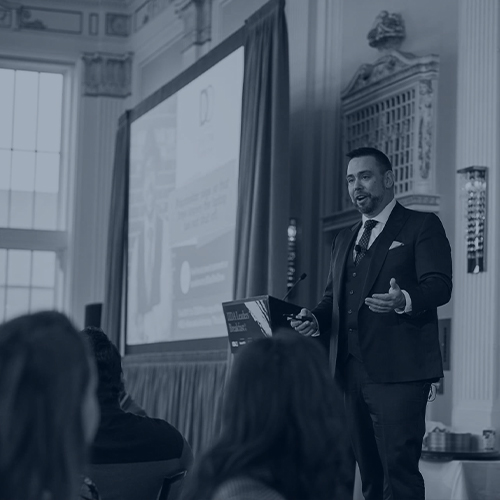Leadership Lies: Undergraduate Degree Required
I spent a decade and a half in the higher education system, and all too often I heard the rallying cry that our institution was “empowering” students for success.
Here’s the thing – I’m concerned the entire university system is built on a tremendously disempowering premise. After all, their business model is based on making people feel disempowered enough to believe they can’t succeed without university.
A Bad Deal
Imagine you’re 18 years old and I offer you this deal:
You give me the equivalent of a down payment for a house. For the next four years, you won’t have the time to actively build a career or generate real savings. It’s more likely than not that you’ll end up in the red when all is said and done.
You’ll be placed within a system where close to 40 percent of the people within it have felt “so hopeless it was difficult to function” in the past 12 months, and 1 out of every 10 has seriously contemplated suicide (according to the National College Health Assessment).
In return I offer the promise of a payoff on your investment. It’s not guaranteed, but I argue it’s likely. However, I personally am not responsible for delivering that payoff. Sure, you give your money to me, but it’s someone else who will provide the return on investment.
No, I have no idea who it might be. Just trust me, they’re out there. It’s worked out for most people.
But no guarantees. And no refunds.
How disempowered do you have to feel to take that deal? How much need for external validation must you have to accept that?
Educational Evangelicals
An unfortunate fact: the majority of students I dealt with in my years running a university leadership development program should not have been in university.
Don’t get me wrong, education is essential, but university was not an education for most of those students. It was an expensive hoop through which they had to jump to enter a workforce that would have taught them a lot more over those four years.
And it would have paid them to do it.
I would never argue that the post-secondary experience is without tremendous social, personal and intellectual benefits for many. What concerns me is the fact that for many of the happiest, most successful people I spend time with, the most valuable thing we got out of a wildly expensive educational experience was each other.
The skills, insights and experiences that have made us great at our jobs (and more importantly, made us love our jobs) were almost all developed after graduation.
Ask almost anyone who is great at their job how they got that way and they’ll tell you the same thing: by doing it.
A brilliant woman I know encapsulated it perfectly:

School doesn’t teach you how to manage twelve people in six countries – two of whom don’t speak English as a first language – in an environment that isn’t built for women, full of uncertainty and ego. That shit is learned in real time.

For many of the students with whom I worked, they could have started “learning that shit in real time” four years sooner. But they firmly believed they wouldn’t be given the chance if they didn’t hand over their money and time to an educational institution first.
Did anyone straight up tell them that? In some cases, sure. A far more powerful push was a culture that has allowed universities to stand before us all as educational evangelicals – holding themselves out as the only ones who can take us to the promised land of success, prestige and wealth–the things too widely seen as the key sources of self-respect in our society.
If you want to be a doctor, lawyer, engineer, professor or other career requiring specific specialized training, by all means post-secondary education should be the path for you. For those who don’t – you should have the option of not accepting the disempowering notion that without a university or college degree you can’t become someone of whom to be proud.
But I’m aware that right now most young people do not feel they have that option. And unfortunately, they’re probably right. The current reality is that choosing not to pursue post-secondary education will likely result in a more difficult and less lucrative career journey.
We need more businesses to show the leadership it takes to change that reality.
Job creators have the opportunity to generate more empowering career paths and options for young people. We can choose to no longer to demand bachelor degrees for jobs that don’t really require them.
Trapped Employees are Bad Employees
I applaud the leadership of companies like Ernst and Young, Penguin Random House, and many more for making that choice. For recognizing the strengths, skills and maturity they’re looking for in employees exist (and perhaps more importantly can be further developed) in debt-free high school graduates. For acknowledging that there is no direct link between post-secondary education and happy, talented, and effective employees.
But how is that showing leadership? How would more organizations making that choice add value to their organizations and society as whole?
Perhaps organizations may begin to see the benefits of having employees who don’t feel trapped by debt. Who are unwilling to take the risks necessary for innovation, growth and personal happiness because “I have student loans to pay.”
The economy may start to see the benefits of a workforce where a smaller percentage of people begin their careers in debt and are more willing to make the purchases that drive the economy. You want an economic stimulus package? Route some of the $15 billion a month that is now flowing to student loan payments* into the construction, manufacturing, automotive and hospitality industries.
Young people may start to see the benefits of actually exploring the world of work rather than guessing what it’s going to be like after graduation. As they are hired, fired, and move from job to job they can discover where their skills might fit, their passions lie, and the specific knowledge they need to acquire in order to grow and develop in the careers that most interest them.
They may get to discover in six months that a career track isn’t right for them, rather than after four years of time and money spent studying it.
It Will Take Work
There’s little doubt this approach will allow many more individuals whose brilliance cannot be measured by essays or tests to demonstrate their worth in the workplace. It will allow so many more young people whose economic circumstances currently keep them from even stepping up to the same career starting line as others to demonstrate that they can thrive within an organization.
It will take more work on the part of the business community. We’ll have to adjust hiring practices to better evaluate skill and potential ourselves, not just the rely on the evaluations of recall and test taking universities are providing us right now.
It will take strength to resist the urge to avoid doing that extra work and just leave things as they are.
It will take risk to start to see our organizations as a place where education must happen, not just commerce.
It will take work, strength and risk in the name of making things better for more people. In the name of empowering more young people socially and economically.
It will take risk, work, and strength. In other words, it will take leadership.
Who’s in?
*Source: studentloanhero.com/student-loan-debt-statistics/







